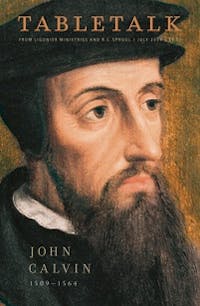
Request your free, three-month trial to Tabletalk magazine. You’ll receive the print issue monthly and gain immediate digital access to decades of archives. This trial is risk-free. No credit card required.
Try Tabletalk NowAlready receive Tabletalk magazine every month?
Verify your email address to gain unlimited access.
As birthdays go, it’s a big one. It is fitting and appropriate that we would mark the five-hundredth anniversary of the birth of John Calvin. Trouble is, that occasion is being marked in at least two different ways. First, those who do not find Calvin to their liking will seek to paint the man as a sour-faced, power-mad, fundamentalist and extremist. The ghost of Servetus will be forced to dance for us once more, and those of us who are grateful for Calvin will be encouraged to repent for our stubborn ways.
On our side of the aisle we will celebrate. We will convene Calvin conferences, we will sponsor symposia, we will publish magazines all designed to honor the man. We will, as we ought, remember his accomplishments. We will, as we ought, take the time to map out the ripples from his life. Some, for instance, have rightly called Calvin the father of our country. Scholars on both sides of the aisle are willing, some even eager to affirm, that much of what makes America distinctively America can be traced back to this pastor of Geneva.
That is influence. That is impact. If these scholars are correct — and they are — that means one man, one very frail man, shaped what would become the most prosperous, powerful, faithful nation in the history of the world. It’s enough to make one want to shout oneself hoarse. We, of course, because we are Calvinists, will remember at least one caveat. We will remember that it was God who was at work in and through Calvin. Calvin was a vessel for the grace of God, first in the lives of those committed to Reformation in Switzerland, and later in Scotland, the Netherlands, England, and beyond. God, after all, not Calvin, is the sovereign one. Our celebration ought to be for the grace of God in this man’s life, more than merely for the man.
Getting that right, however, still leaves us with a fundamental problem in how we look at the phenomenon that was John Calvin. It’s good and right to see these ripples for what they actually were, great thundering tsunamis. It is in turn fitting that we should remember in the end that it is the Lord whom the wind and the waves obey, that what we are celebrating is what He has wrought. Let us not miss, however, how God brought this to pass in and through John Calvin.
Calvin was a man focused on a single goal. Though his life shaped our theology, our understanding of liberty, our conception of the state, our grasp of vocation, of the arts, of every “slice” of our lives, his goal was simple, uncluttered, alone. Calvin did not set out to reform our conceptions of this meta-theme or that. No, Calvin’s single concern was that God’s people would learn aright to worship the living and true God. Worship was what shaped him. Worship was what drove him. Worship was what formed Geneva and all that followed after. Please don’t misunderstand. Calvin didn’t believe that in order to remake the world, we must remake worship. Instead, Calvin understood that we must remake worship. Everything else is icing. To put it another way, Calvin understood that we must seek first the kingdom of God and His righteousness, not so that we might have all these things added to us, but so that we might have the one needful thing — the kingdom of God and His righteousness.
We, the heirs of Calvin, have forgotten this lesson. We, if we think about worship at all, see it as a means to the end. The end we have in mind is the power and the glory. We want to build political coalitions that we might change the world. We want to overcome the powers of the Hollywood elite that we might change the world. We want to remake the economic landscape that we might change the world. What God wants is that we would bow down in repentance and give glory to His name. What God wants is what Calvin did.
When Jesus told us to seek first the kingdom of God and His righteousness, He wasn’t telling us: “Now when you go about your life, when you pursue your goals, don’t forget the big picture. Don’t lose sight of why you do what you do.” Instead Jesus was telling us: “Seek this. Seek this alone. Forget about everything else. Have a single-minded passion and leave the rest alone. It is in my hands anyway.”
We, on the other hand, have it all upside down and backwards. We will, especially this year, look at the glory that once was Geneva because of the ministry of Calvin. We will, especially this year, look out at all the nations that felt the ripples of Calvin, moving from Geneva, to England, to these United States, then back out across the globe through the modern missionary movement. We will, especially this year, remember the great economic power that was unleashed with the spread of liberty that likewise redounds to Calvin. What we will miss is the true glory, the real story. What we will miss is the unvarnished beauty of a single congregation in one neighborhood of Geneva, bowing in prayer to the living God, lifting up their voices, singing the Psalms of God, receiving the Word preached, and receiving the Word as bread and wine. There is where the glory is found.
